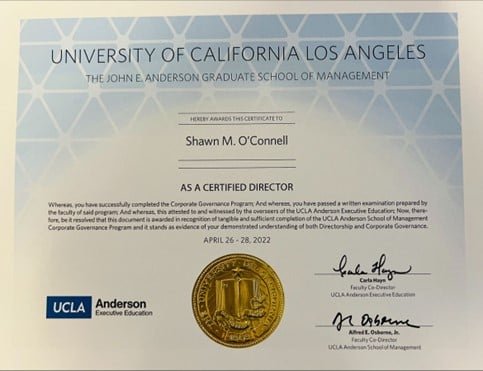
Prioritizing the G in ESG
When people think about Environmental, Social and Governance (ESG), many are able to quickly think of examples for the “E” (environment) and the “S” (social) components of the concept. Things like waste reduction, utility usage, labor relations and workplace safety are tangible. The “G” in ESG – governance – is often less tangible, but that doesn’t mean it’s less important. That’s why Shawn O’Connell, Global President of Motive Power at EnerSys®, decided to become certified in Corporate Governance at the UCLA Anderson School of Management.

Governance in ESG represents the guidelines and rules around decision-making, information disclosure, auding, compliance and more within an organization. Shawn’s course covered a variety of topics related to corporate governance, but Shawn was most intrigued by what he learned about the proposed Securities and Exchange Commission (SEC) regulations on climate disclosures. These proposed rules would require publicly-traded companies to include certain climate-related disclosures in their periodic statements and reports in a way that shows how climate impacts business.
“Today, the efforts around sustainability are often subjective for many companies – there’s no clear-cut way to tell if things are ‘good’ or ‘bad’ when it comes to climate,” says Shawn. “The proposed SEC regulations are fascinating because the commission will begin to build out more objective guidelines and governance around climate goals. Luckily for EnerSys, we’re in a great position to meet any and all of the proposed SEC climate rules.”
Beyond the valuable lessons learned about the latest SEC proposals, Shawn had other takeaways on how to improve governance for his Motive Power team of over 1,700 employees. “I take pride in regularly keeping my team informed on what the board and leadership team is thinking and working on,” says Shawn, “I hold quarterly town halls to make sure that my team is aligned at all business levels to ensure we’re headed in the same direction with the same momentum. Good corporate governance underscores how important it is to ensure clear communication and alignment for the success of my team and the company as a whole.”
As EnerSys looks to further progress on ESG, it’s imperative that we have strong leaders who are eager to learn more and strengthen the company’s competitive edge on key issues that help mitigate risk and size opportunity. By practicing good governance, we’re strategically posed to advance initiatives related to the environmental and social components of ESG and position the company for a successful future.